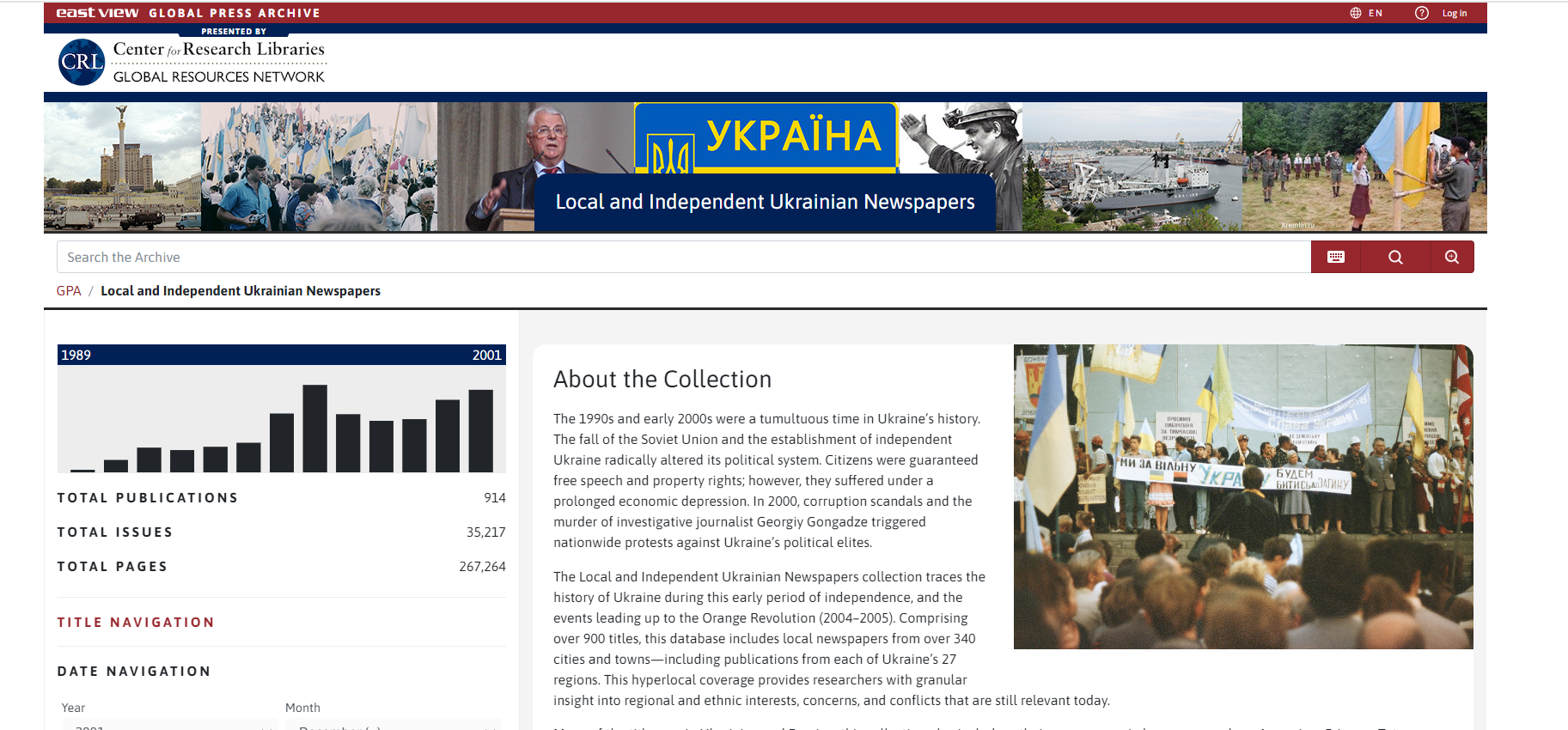History Collection
Primary Sources: 1980s Culture and Society
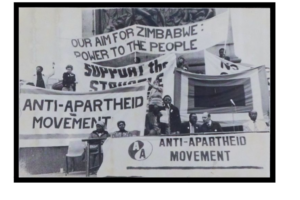 The Library now has access to the online archive 1980s Culture and Society, which brings together resources from archival collections in the US, UK, Australia, and Canada.
The Library now has access to the online archive 1980s Culture and Society, which brings together resources from archival collections in the US, UK, Australia, and Canada.
“From the rise of Conservatism, the threat of nuclear war, and the AIDS crisis, to rampant consumerism, economic crises, and technological advancements, the 1980s was a turbulent and complex decade in which some individuals reaped significant benefits whilst others experienced severe poverty and hardship. Drawing on material from the late 1970s through to the early 1990s, this resource focuses on the voices of under-represented groups, grassroots organizations, and countercultural movements, addressing themes such as sexuality and identity, Black resistance movements, Indigenous land rights, subcultures, and health and social issues.
“These themes are represented within a broad range of sources which feature a variety of perspectives. For example, campaign materials, newspapers and newsletters from grassroots organizations and local communities provide a keen insight into social and political activism during the 1980s, whilst government papers and speeches from the Reagan and Thatcher administrations demonstrate the rise in political conservatism that dominated the decade. Collections of zines highlight the rich creativity and productivity of 80s subcultures, whilst mainstream and consumer culture is epitomised in fashion catalogues, photojournalism and gaming ephemera.” (Source)
Primary Sources: Colonial America
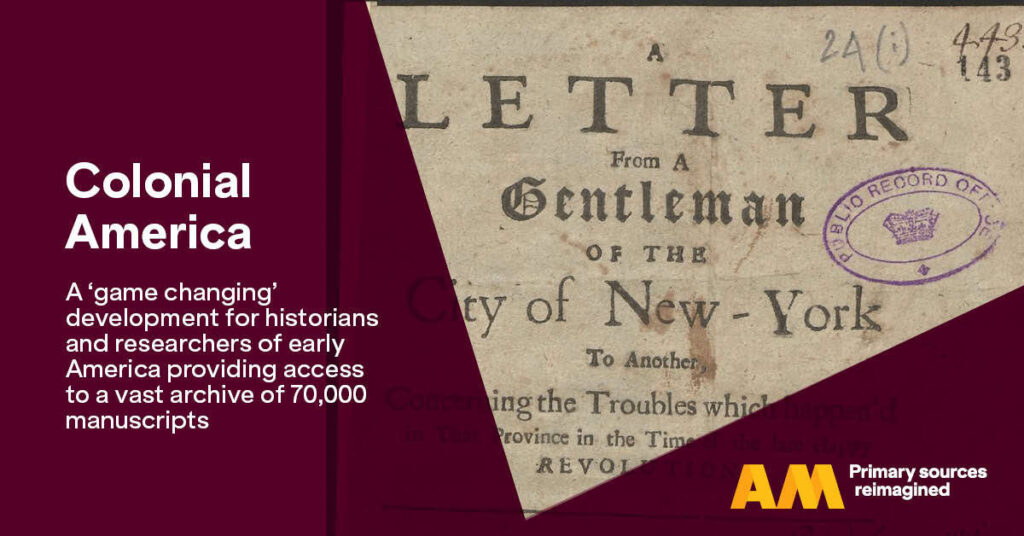
The Library now has access to all five modules of Colonial America, a digital archive produced by AM (formerly Adam Matthew Digital). This resource provides an extensive collection of primary source documents related to the history of Colonial America, spanning from the 16th to the 18th century. The resource offers a comprehensive collection of materials that includes correspondences, diaries, maps, pamphlets, and other types of documents. These sources provide valuable insights into the social, political, and economic aspects of life during the colonial period in North America.
Primary Sources: Amnesty International Archives, 1961-1991
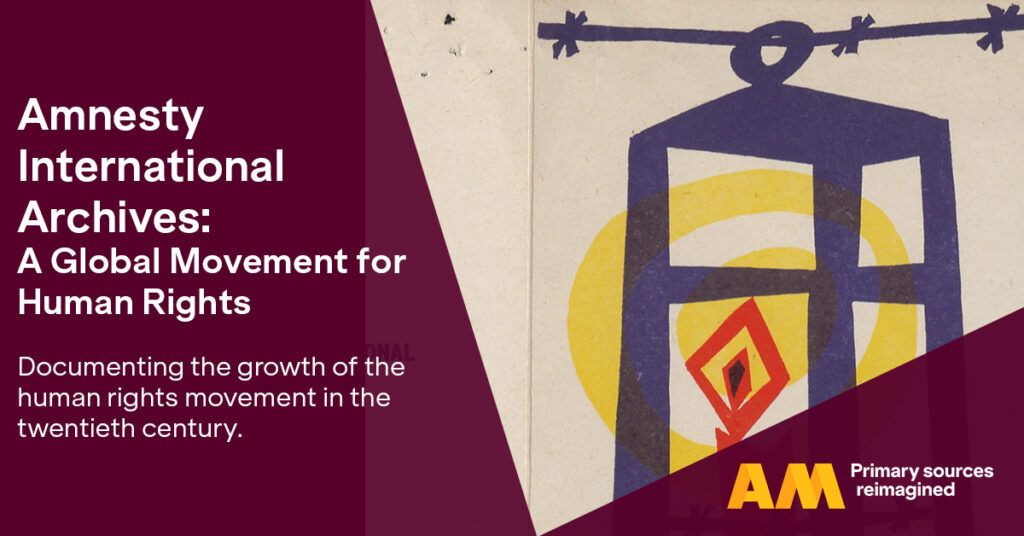
The Library has recently acquired access to The Amnesty International Archives, which “publishes the records of Amnesty International from the second half of the twentieth century. The material contains minutes, reports, correspondence, first-hand accounts, publicity materials and circulars relating to human rights violations of all kinds in all parts of the world. Amnesty International’s remit of campaigning for an end to human rights abuses means that this archival material inherently relates to the themes of oppression, cruelty and degradation.” (Source)
Some of the collections include documents from outside the organization.
Primary Source: Egypt and the Rise of Nationalism
The Library has acquired access to Egypt and the Rise of Nationalism, an online collection of British government documents “that capture and reflect an era spanning from the first appearance of a nationalist sensibility to its gradual entrenchment in public life through protests, journalistic agitprop, lobbying activities, sporadic violence, and then — almost as a denouement — through an ordered political process, in the context and perspective of Britain’s evolving policy regarding Egypt.” (source)
The resource includes more than 4000 primary source documents dating from the 1870s until approximately 1924.
Primary source: Public Housing, Racial Policies, and Civil Rights
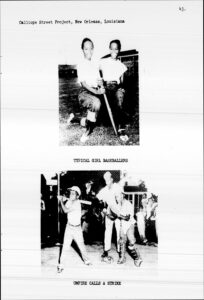 Public Housing, Racial Policies, and Civil Rights: The Intergroup Relations Branch of the Federal Public Housing Administration, 1936-1963 includes directives and memoranda related to the Public Housing Administration’s policies and procedures. Among the documents are civil rights correspondence, statements and policy about race, labor-based state activity records, local housing authorities’ policies on hiring minorities, court cases involving housing decisions, racially-restrictive covenants, and news clippings. The intra-agency correspondence consists of reports on sub-Cabinet groups on civil rights, racial policy, employment, and Commissioner’s staff meetings.
Public Housing, Racial Policies, and Civil Rights: The Intergroup Relations Branch of the Federal Public Housing Administration, 1936-1963 includes directives and memoranda related to the Public Housing Administration’s policies and procedures. Among the documents are civil rights correspondence, statements and policy about race, labor-based state activity records, local housing authorities’ policies on hiring minorities, court cases involving housing decisions, racially-restrictive covenants, and news clippings. The intra-agency correspondence consists of reports on sub-Cabinet groups on civil rights, racial policy, employment, and Commissioner’s staff meetings.Primary Source: FBI Files on Martin Luther King, Jr.

Full text access to the FBI’s file on the assassination of Martin Luther King, Jr. is available on the GALE platform. “The 44,000-page case file … documents the bureau’s role in finding Ray and obtaining his conviction. The file also includes background information amassed by the FBI on Dr. King’s social activism.”
Black Freedom Struggle in the 20th Century: Federal Government Records, on the Proquest platform, includes the two FBI files on Martin Luther King, Jr. Part 1
“details the heavy surveillance and painful harassment that J. Edgar Hoover’s FBI directed against America’s foremost civil rights leader throughout the 1960s.” Part 2 consists of verbatim transcripts and detailed summaries of telephone conversations between King and one of his most trusted confidants, Stanley D. Levinson.
Primary Sources: Decolonization: Politics and Independence in Former Colonial and Commonwealth Territories
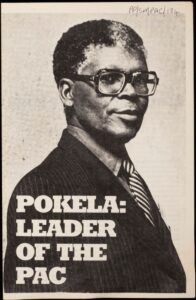 The Gale digital archive Decolonization: Politics and Independence in Former Colonial and Commonwealth Territories includes primary sources related to the complex process of decolonization across 60 former colonial territories and Commonwealth nations in the 20th century. The core content consists of over 250,000 pages of rare pamphlets, newsletters, correspondence, posters, and other ephemera produced by political parties, pressure groups, trade unions, and grassroots movements. This includes the Political Pamphlets collection from the Institute of Commonwealth Studies, African Trade Union pamphlets from Nuffield College at Oxford, and the Marjorie Nicholson Papers on international trade unionism.
The Gale digital archive Decolonization: Politics and Independence in Former Colonial and Commonwealth Territories includes primary sources related to the complex process of decolonization across 60 former colonial territories and Commonwealth nations in the 20th century. The core content consists of over 250,000 pages of rare pamphlets, newsletters, correspondence, posters, and other ephemera produced by political parties, pressure groups, trade unions, and grassroots movements. This includes the Political Pamphlets collection from the Institute of Commonwealth Studies, African Trade Union pamphlets from Nuffield College at Oxford, and the Marjorie Nicholson Papers on international trade unionism.
This archive is structured into thematic sections that address different facets of decolonization. These sections cover topics such as the rise of nationalist movements, key figures who led their nations to independence, and the residual impacts of colonial rule including economic dependencies and the development of new national identities. Additionally, it explores the involvement of international bodies like the United Nations in supporting decolonization efforts.
Primary Sources: Environmental History: Conservation and Public Policy in America, 1870-1980
Environmental History: Conservation and Public Policy in America, 1870-1980 is a digital archive from Gale that provides access to sources documenting the emergence of conservation movements and the rise of environmental public policy in North America from the late 19th to the late 20th century.
The archive offers an incisive view into the efforts of individuals, organizations, and government agencies that shaped modern conservation policy and legislation. It includes:
- Papers of early environmentalists like George Bird Grinnell, a founding member of the Boone and Crockett Club and the first Audubon Society, and Joseph Trimble Rothrock, known as the “father of forestry.”
- Records of the American Bison Society, which helped save the American bison from extinction, and papers of women conservationists like Rosalie Edge and Velma “Wild Horse Annie” Johnston.
- Documents from the U.S. Forest Service, U.S. Bureau of Reclamation, and various state and municipal agencies focused on conservation and land-use matters.
- Grey literature from advocacy organizations, study groups, and commissions covering wildlife management, land preservation, public health, energy development, and more.
This archive provides valuable context for understanding today’s environmental challenges by chronicling the historical struggle to balance economic exploitation and resource conservation. It offers insights into the grassroots movements, advocacy efforts, and policy decisions that laid the foundation for modern environmental protection.
The resource includes grey literature on conservation and environmental policy from UC Berkeley’s Institute of Governmental Studies Library.
Primary Sources: 19th Century British Pamphlets
Due to budget cuts, the Library ended its previous subscription to this resource. Access has been restored through a purchase of JSTOR content by the California Digital Library.
From the JSTOR site: “Throughout the 19th century, pamphlets were an important means of public debate, covering the key political, social, technological, and environmental issues of their day. 19th Century British Pamphlets, created by Research Libraries UK (RLUK), contains the most significant British pamphlets from the 19th century held in research libraries in the United Kingdom.”
More than 26,000 pamphlets from seven major UK research institutions are searchable and browsable in JSTOR.
Bristol Selected Pamphlets 1800-1899
Cowen Tracts 1603-1898
Earl Grey Pamphlets Collection 1800-1900
Foreign and Commonwealth Office Collection 1545-1900
Hume Tracts 1769-1890
Knowsley Pamphlet Collection 1792-1868
LSE Selected Pamphlets 1800-1899
Manchester Selected Pamphlets 1799-1900
Wilson Anti-Slavery Collection
I recommend reading the guides provided by the project, which describe more fully the content of the collections and how to search them. The guides also point out that the pamphlets don’t only reveal contemporary viewpoints, they contain statistics, illustrations, maps, and other evidence that would inform your research. Because pamphlets were sometimes published in response to another publication putting forward an opposing viewpoint, tracking them can provide insight into public debates.
Local and Independent Ukrainian Newspapers on Global Press Archive Electronically Available
The 1990s and early 2000s marked a turbulent period in Ukraine’s history due to the fall of the Soviet Union and the emergence of an independent Ukraine. Despite gaining free speech and property rights, citizens faced economic hardships. Corruption scandals and the murder of journalist Georgiy Gongadze in 2000 sparked nationwide protests against the political elite. The Local and Independent Ukrainian Newspapers collection covers this era up to the Orange Revolution (2004–2005), offering insights from over 900 newspapers across 340 cities, reflecting regional and ethnic dynamics. The collection includes publications in Ukrainian, Russian, and other languages like Armenian, German, Polish, etc., providing a detailed view of historical events. Access to this database is supported by the Center for Research Libraries and its members.
One can access this collection here.
